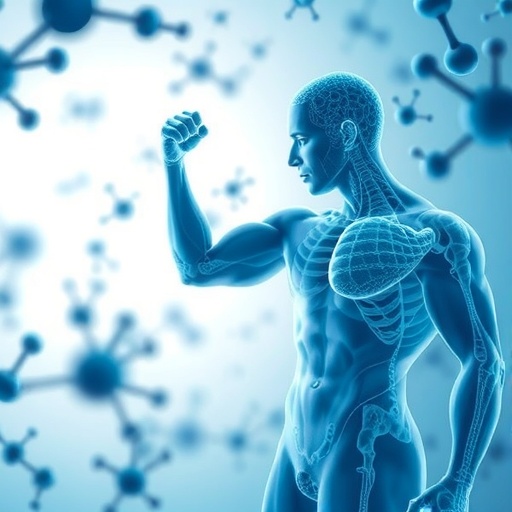In a groundbreaking study published in Nature Communications, researchers have unveiled a novel molecular mechanism that links redox regulation to testosterone synthesis and aging, providing promising avenues for therapeutics targeting age-related decline in reproductive and metabolic health. The team, led by Zhang, Ma, Zhuang, and colleagues, focused on the pivotal role of PRDX1, an antioxidant enzyme, in orchestrating cellular processes that sustain hormone production and combat the physiological deterioration associated with aging.
Testosterone, a critical androgen hormone, plays a fundamental role not just in male reproductive function but also in maintaining muscle mass, bone density, and overall metabolic health. However, its levels naturally decline with age, contributing to a host of health issues including reduced libido, osteoporosis, and metabolic syndrome. The molecular basis of this decline has been partly elusive, but this new study sheds light on how oxidative stress and autophagic mechanisms intersect to modulate testosterone biosynthesis during aging.
Central to the findings is PRDX1 (Peroxiredoxin 1), an enzyme well-known for its antioxidant properties in reducing intracellular peroxide levels. The researchers demonstrated that PRDX1 actively promotes testosterone production by exerting precise redox control over ATG4B, a cysteine protease crucial for the autophagic process specifically involving lipophagy—the selective autophagic degradation of lipid droplets. Through rigorous biochemical assays and in vivo models, it was shown that PRDX1-mediated redox regulation maintains the enzymatic activity of ATG4B, which in turn facilitates efficient lipophagy.
Lipophagy is essential for lipid metabolism and energy homeostasis, especially in steroidogenic cells such as Leydig cells in the testes, where cholesterol liberated from lipid droplets serves as the precursor for testosterone biosynthesis. The study highlights that diminished PRDX1 expression or disrupted redox balance leads to impaired ATG4B function, accumulation of lipid droplets, and subsequently reduced testosterone levels. This mechanistic insight directly links autophagic lipid turnover to hormone synthesis, positioning lipophagy as a critical factor in reproductive aging.
Intriguingly, the attenuation of PRDX1 seen with increasing age exacerbates oxidative stress, which negatively impacts not only testosterone production but also cellular homeostasis broadly. The study revealed that restoration of PRDX1 activity could mitigate some of the deleterious effects of aging by reinvigorating autophagy pathways and improving testosterone output. By genetically or pharmacologically enhancing PRDX1 function, the researchers achieved notable improvements in lipophagy efficiency and hormone levels in aged animal models.
The molecular interplay characterized in this study underlines an elegant feedback mechanism: PRDX1 preserves ATG4B’s functional state through redox-sensitive cysteine residues, ensuring sustained autophagic clearance of lipid stores necessary for steroidogenesis. This relationship exemplifies a sophisticated cellular strategy to adapt to age-related oxidative challenges and maintain endocrine functions.
Furthermore, the implications of these findings extend beyond reproductive health. Testosterone has systemic roles influencing metabolic processes, cardiovascular function, and cognitive health. The ability of PRDX1 to regulate lipophagy and thereby sustain testosterone production offers a potential therapeutic target for age-related diseases marked by hormonal insufficiency and metabolic dysregulation.
The study employed cutting-edge molecular biology techniques including redox-sensitive fluorescent probes, CRISPR-Cas9 mediated gene editing, and advanced lipidomics to delineate these pathways. In-depth structural analyses elucidated how oxidative modifications on ATG4B affect its substrate affinity and proteolytic activity, providing a biochemical foundation for the observed phenotypes.
Importantly, the research highlights that autophagy is not merely a bulk degradation process but highly selective and finely regulated by cellular redox states. This revelation opens doors to new research exploring how redox biology integrates with autophagic machinery to maintain intracellular lipid homeostasis—a concept that could be pivotal in many age-associated disorders beyond endocrinology.
The translational potential of modulating PRDX1 activity or enhancing lipophagy is vast. Targeted therapies could potentially rejuvenate testosterone production in elderly patients, combating sarcopenia, frailty, and metabolic syndrome. Moreover, these insights may inform strategies to boost resilience against oxidative damage, a hallmark of many chronic illnesses.
While further clinical studies are necessary to validate the efficacy and safety of manipulating PRDX1 pathways in humans, the current evidence positions this antioxidant enzyme as a critical nexus in aging biology. It integrates redox sensing with metabolic regulation via autophagy, orchestrating hormone synthesis and cellular longevity.
This research represents a paradigm shift in understanding the biochemical crosstalk between oxidative stress management and hormone metabolism. By illuminating how PRDX1 controls ATG4B-mediated lipophagy to sustain testosterone synthesis, it reveals a vital mechanism through which cellular redox homeostasis can delay aging phenotypes.
As scientists continue to unravel the complexity of aging at the molecular level, the identification of PRDX1’s role provides a promising foundation upon which new interventions against age-associated decline can be built. This could lead to innovative therapeutics not only for hypogonadism but also for broader conditions where oxidative stress and autophagic dysfunction contribute to pathology.
In summary, the study by Zhang et al. expands our understanding of endocrine aging by detailing how redox regulation of autophagy components maintains lipid turnover critical for testosterone production. This nexus between antioxidant defense, lipid metabolism, and hormone biosynthesis highlights an exciting frontier in aging research with transformative clinical potential.
Subject of Research:
Molecular mechanisms by which PRDX1 regulates testosterone synthesis and aging via redox control of ATG4B-mediated lipophagy.
Article Title:
PRDX1 promotes testosterone synthesis and attenuates aging via redox regulation of ATG4B to modulate lipophagy.
Article References:
Zhang, H., Ma, K., Zhuang, Y. et al. PRDX1 promotes testosterone synthesis and attenuates aging via redox regulation of ATG4B to modulate lipophagy. Nat Commun 16, 10181 (2025). https://doi.org/10.1038/s41467-025-65328-4
Image Credits: AI Generated




